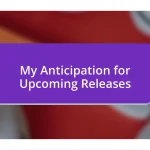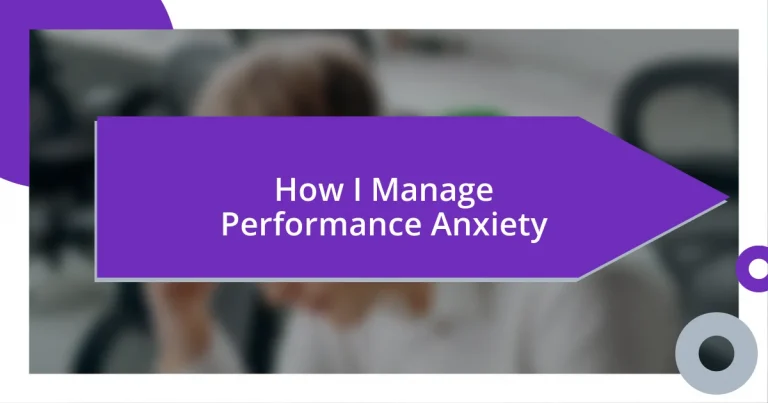Key takeaways:
- Performance anxiety is a common experience rooted in fear of failure, and recognizing triggers and symptoms is crucial for managing it effectively.
- Developing coping strategies, such as deep breathing and visualization techniques, helps transform anxiety into confidence and enhances performance.
- Establishing a support system and evaluating progress through self-reflection fosters resilience and allows for adjustments to strategies when needed.
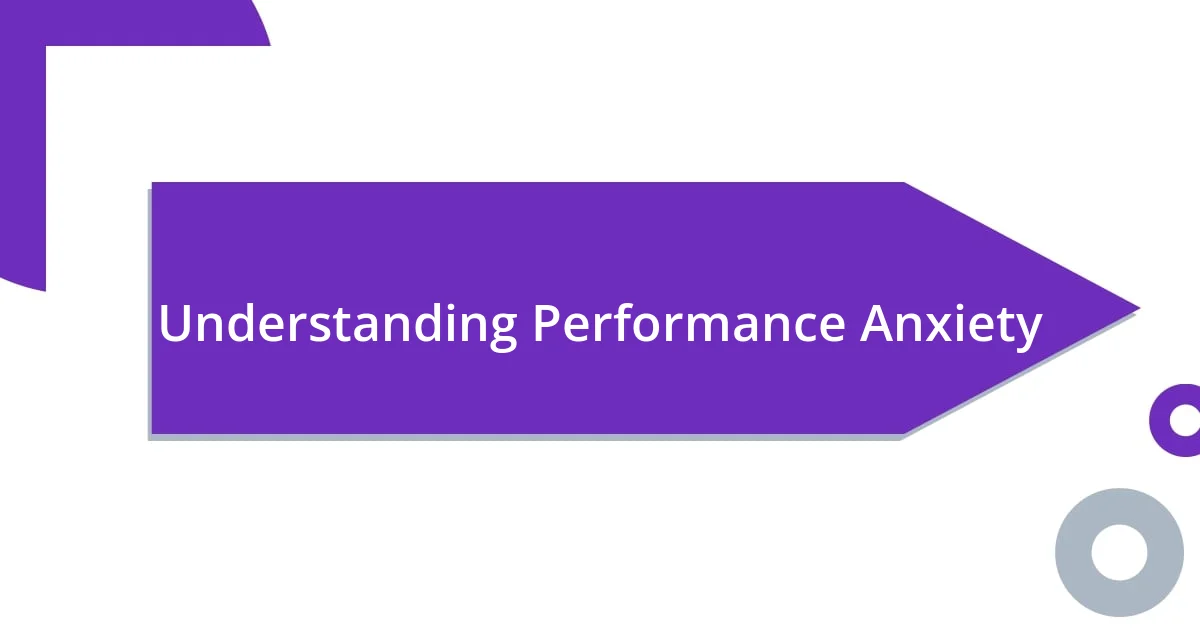
Understanding Performance Anxiety
Performance anxiety is a universal experience that many of us face, whether it’s stepping onto a stage, giving a presentation at work, or even engaging in social situations. I remember vividly my first time speaking at a conference; my heart raced, and my palms were sweaty. Was the fear of judgment real, or was it something I had conjured in my mind?
At its core, performance anxiety stems from a fear of failure or not living up to expectations—both our own and those imposed by others. I often find myself questioning, “What if I forget my lines?” or “What if nobody engages with my presentation?” These thoughts can be paralyzing, making it difficult to focus on the task at hand. This heightened self-awareness can create a vicious cycle, where the fear of performing poorly only increases the likelihood of not performing well.
Understanding this anxiety is crucial for addressing it effectively. It helps to remind myself that even seasoned performers experience jitters. There’s comfort in knowing that I’m not alone in feeling this way. I find that sharing these feelings with others often opens up a dialogue, leading to shared strategies and collaborative reassurance. Have you ever felt that spark of connection with someone just by discussing your common fears? It’s a small yet powerful step in turning anxiety into an opportunity for growth.
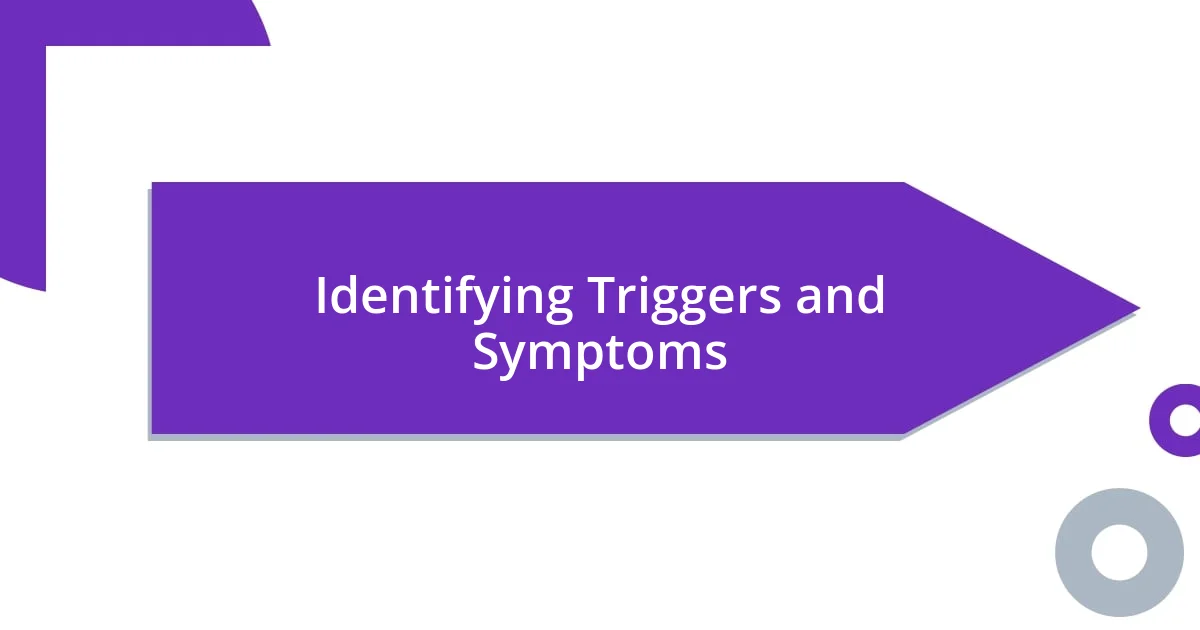
Identifying Triggers and Symptoms
Identifying triggers and symptoms of performance anxiety can be quite enlightening. I often find that specific situations elicit a physical response before I even realize what’s happening. For example, I can sense that familiar knot forming in my stomach when I think about an upcoming presentation. It’s as if my body knows something my mind hasn’t fully processed yet. Recognizing these symptoms early allows me to take proactive steps to manage them.
Here are some common triggers and symptoms to watch for:
- Increased heart rate
- Sweaty palms
- Dry mouth
- Shallow breathing
- Intensified self-criticism
- Nervousness in social situations
Being aware of these signs not only helps me identify when my anxiety is creeping in but also reminds me to pause and assess how I can channel that energy into something more productive. When I acknowledge these triggers, I bring them into the light instead of letting them fester in the dark corners of my mind. It’s empowering, and it shifts the focus from fear to understanding.
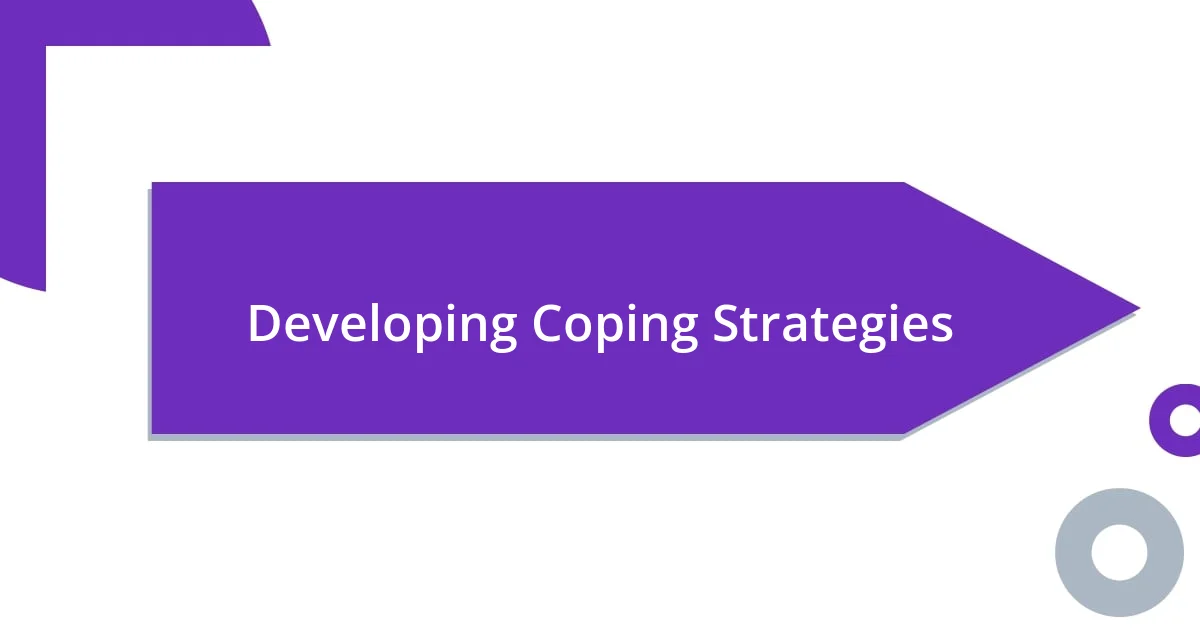
Developing Coping Strategies
Developing coping strategies is essential for effectively managing performance anxiety. I’ve discovered that deep breathing exercises work wonders for me, especially when anxiety begins to swell. Taking a moment to breathe deeply can ground me, calming my racing thoughts and allowing me to focus on the task rather than the fear. Have you tried breathing techniques? They can be surprisingly transformative.
Alongside breathing exercises, visualization techniques have played a pivotal role in my journey. I find that picturing myself succeeding—standing confidently in front of an audience and delivering my message with poise—helps create a sense of familiarity with the scenario. This mental rehearsal builds a bridge between fear and confidence, making it easier for me to stride into those daunting situations with a clearer mind and less tension. It’s fascinating how our minds can become allies in overcoming our fears.
Another strategy that has significantly helped me is establishing a routine before performances. I typically listen to calming music or engage in a brief physical warm-up. This routine signals to my brain that it’s time to transition from anxiety to action. I notice that sticking to this routine centers my energies and reduces the unpredictability that often triggers my anxiety. Creating a structure around my preparations not only alleviates stress but also fosters a sense of accomplishment as I progress.
| Coping Strategy | Description |
|---|---|
| Deep Breathing | A technique to calm nerves by focusing on inhaling and exhaling deeply. |
| Visualization | Picturing oneself succeeding in the performance to build confidence. |
| Establishing a Routine | Creating a consistent pre-performance habit to reduce unpredictability. |
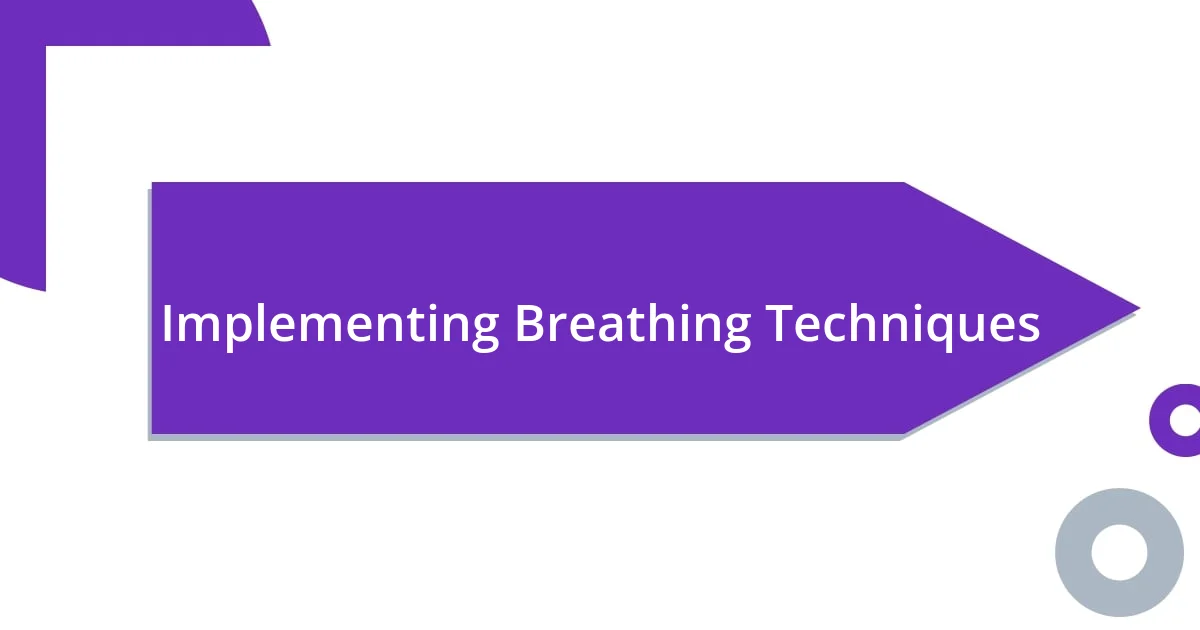
Implementing Breathing Techniques
Implementing breathing techniques has been a game changer for me when facing performance anxiety. I vividly remember one particular occasion during a tense job interview; my heart raced, and my palms were slick with sweat. In that moment, I paused, closed my eyes, and took a few deep breaths. Each inhale filled me with calm, while each exhale released the mounting pressure. Isn’t it amazing how just a few breaths can pivot your entire mindset?
One method I like to use is the 4-7-8 technique. I inhale deeply for four counts, hold my breath for seven, and then exhale slowly over eight counts. This rhythmic pattern not only slows down my heartbeat but also gives my mind a chance to reset. I often think of it as hitting the “refresh” button, bringing clarity when the anxious thoughts start to swirl. Have you ever noticed how the simple act of breathing can transform a moment?
Another approach I find deeply effective is the diaphragmatic breathing technique. This consciously engages my diaphragm, allowing for fuller breaths and a deeper sense of relaxation. I remember practicing this right before a presentation I was dreading. Just a few minutes of breathing deeply helped me shake off that heavy sense of dread. Incorporating these techniques isn’t just about anxiety relief; it’s about reclaiming my power over my emotions in those high-pressure moments. What could you do with a bit more control over your breath?
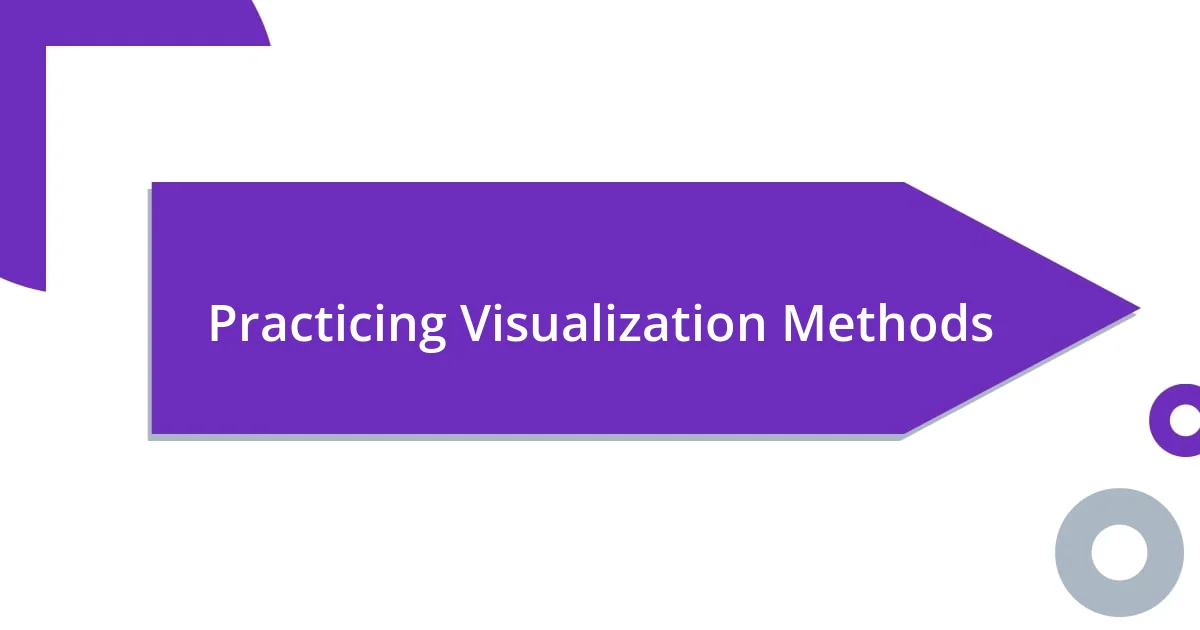
Practicing Visualization Methods
Practicing visualization methods has often felt like stepping into an alternate reality for me. I vividly remember the first time I tried it before a major presentation. Instead of visualizing the audience’s judgment, I pictured them smiling and engaged, giving me an enthusiastic nod. This shift not only lessened my fear but also infused my performance with genuine excitement. Have you ever imagined a positive outcome that completely transformed your mindset?
One of my favorite techniques is to create a detailed mental movie. I close my eyes and envision every aspect of the event, from the sound of my voice to the expressions on the audience’s faces. When I did this before a challenging speech, I mentally rehearsed walking onto the stage, hearing the applause, and delivering my points with clarity and confidence. That imagery became a source of strength, helping me face reality with a sense of empowerment. How detailed can you make your mental pictures?
Preparing my mind in this way, I’ve realized, is like priming a pump. The more I engage with these positive visuals, the more they become ingrained in my subconscious. I can’t help but marvel at how my thoughts can shape my reality. This process made me feel like I was already a success before I even stepped onto the stage. Can you see how visualization could act as a rehearsal for triumph? It’s truly a remarkable tool in managing performance anxiety.
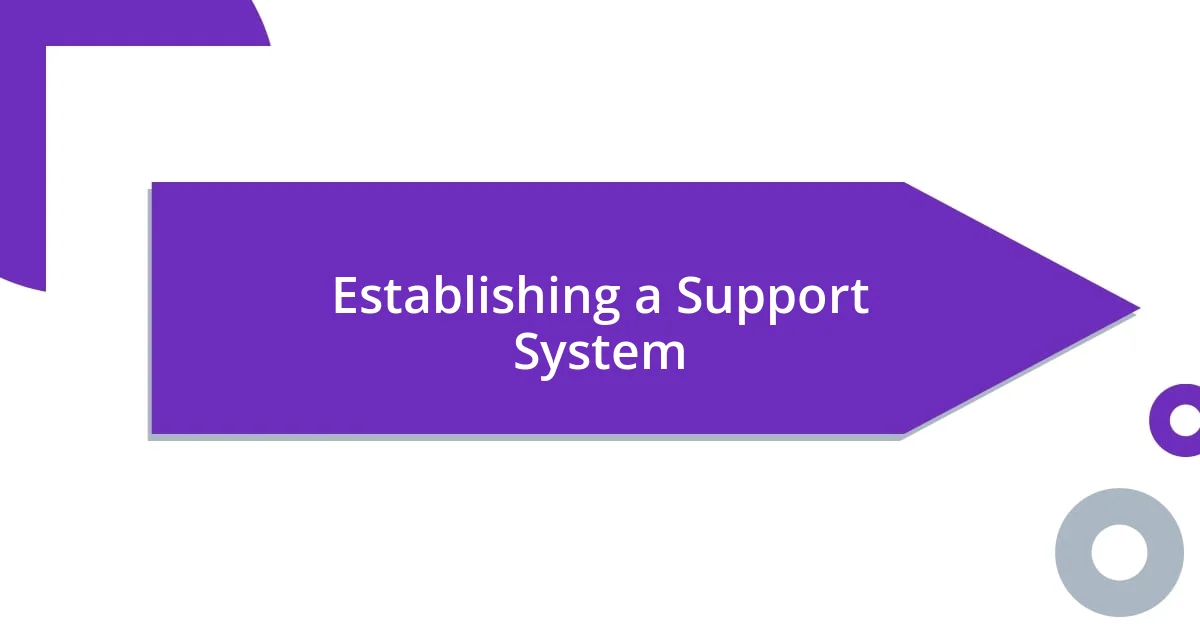
Establishing a Support System
Establishing a solid support system has been crucial in my journey to manage performance anxiety. I clearly remember a time when I shared my worries with a close friend before a big event. Their encouraging words and understanding made me feel less alone, almost like I was carrying a lighter load. Have you ever noticed how just talking about your fears can lift some of their weight?
Involving trusted individuals in my preparation process has also had a profound impact. For example, I often practice my speeches with a small group of friends who provide honest feedback and encouragement. Their presence creates a non-judgmental space where I can express my anxieties freely. I find it reassuring to know they’re cheering me on, which helps me channel any nervous energy into a more focused performance. Isn’t it amazing how a little support can make such a difference?
Moreover, I’ve learned the value of having diverse perspectives in my support system. When I confide in family members who have different experiences, they often offer insights I hadn’t considered. The emotional uplift from those discussions fosters a sense of camaraderie, reminding me that I’m not navigating this journey alone. How impactful do you think it is to have a variety of voices helping you along the way? It truly enriches my approach to facing challenges head-on.
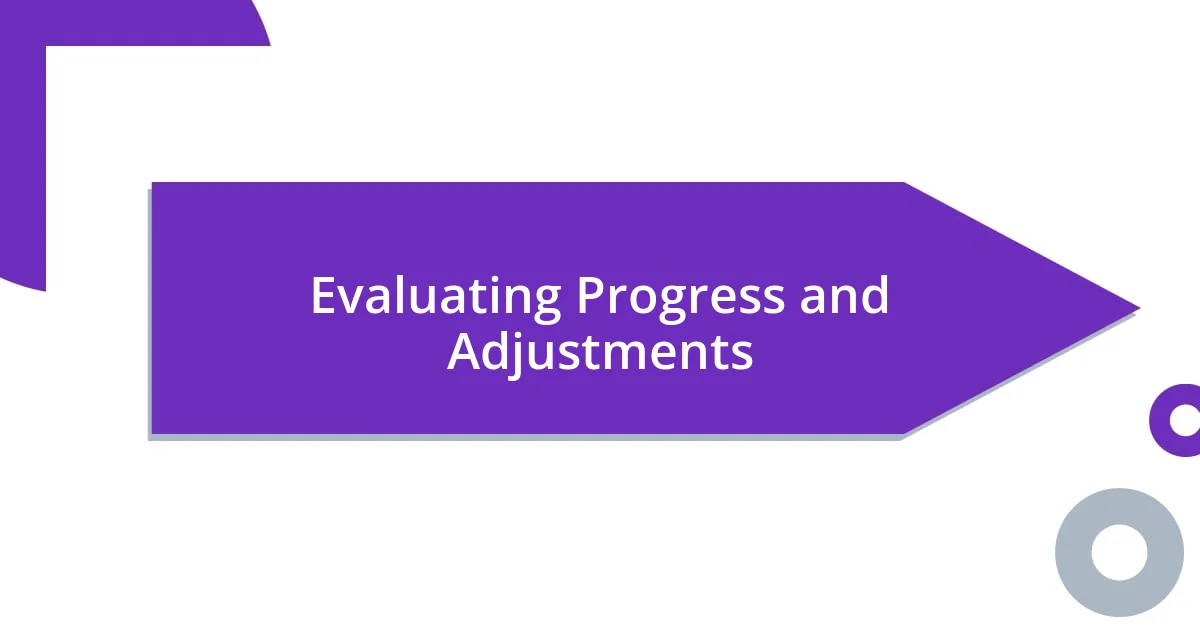
Evaluating Progress and Adjustments
Evaluating my progress in managing performance anxiety has been like keeping a journal of my emotional landscape. After each event, I take a moment to reflect on what worked and what didn’t—I often ask myself, “Was I more focused on my message than my fear?” Tracking these moments has allowed me to identify patterns in my anxiety, revealing that certain situations trigger me more than others. It’s fascinating how self-reflection can lead to breakthroughs in understanding my emotional triggers.
I’ve also come to appreciate the importance of flexibility in my approach. For instance, when I noticed that my usual visualization techniques were losing their effectiveness, I decided to mix things up by incorporating breathing exercises before stepping onto the stage. This adjustment not only added a new layer to my preparation but also calmed my racing thoughts—sometimes the smallest tweaks can make a significant difference. Have you ever found that a slight change can lead to a more profound impact on your performance?
Progress isn’t just about recognizing what went right; it’s equally about acknowledging setbacks without judgment. There have been days when, despite my best efforts, anxiety crept in and overshadowed my preparation. Instead of being hard on myself, I treat those moments as learning opportunities. This mindset shift has cultivated resilience in me, reminding me that every experience, whether positive or challenging, is a step forward on the path to growth. How do you handle moments that don’t go as planned in your own journey? I find that embracing vulnerability can be incredibly empowering.










